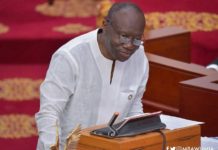
The depreciation of the local currency against major trading currencies, this year has been attributed to intensified portfolio outflows from the local bond market.
This was contained in the September 2018 edition of the African Markets Revealed (AMR) report by the Standard Bank, the parent company of Stanbic Bank Ghana.
The report indicates that the local currency bond market has been hugely affected by negative sentiments, causing foreign investors to sell down their holdings of the local paper.
“Negative sentiment towards emerging markets has prevailed. Some local currency bond markets have been affected by this negativity, especially Egypt, Ghana, Nigeria and Zambia, with foreign investors in those markets selling down their holdings of local paper. That said, secondary market yields in some of these markets reflect the stressed selling,” the report said.
The consequence of this, is an upward pressure on the local currency and an increased demand for forex. The AMR report noted, “We see USD/GHS heading higher over the coming 12 months, rising at an annualised pace of between 5% and 8% in the medium term. The upward pressure on the pair between April and September may well have been exacerbated by portfolio outflows from the local bond market.
“However, holdings of local bonds by foreigners did not change much in that period. But, the increased demand for forex may have emanated from the repatriation of coupon payments that were not reinvested. A turnaround in portfolio flows, triggering a fresh round of inflows into the market, cannot be ruled out once economic margin flux settles down.”
These factors notwithstanding, researchers and economists at Standard Bank believe that the fundamentals of the Ghanaian economy still remain strong with a tighter fiscal policy. According to the report, “we are still of the view that the Ghanaian BOP is in a much stronger position than it was between 2012 and 2015 when USD/GHS was rising at more than a 20% annualised pace. Compared to the period between 2012 and 2015, fiscal policy is tighter.”
This is further augmented by the aggressive posturing of the Central Bank’ Monetary Policy Committee in ensuring that there is more surplus than a deficit in the country’s balance of payment.
“Furthermore, the BOG’s Monetary Policy Committee has adopted a rather hawkish stance. Of course, the trade account is arguably much stronger now too, with surpluses more likely than deficits in the coming years due to a ramp-up in oil production, while exports of gold and cocoa are likely to remain strong as well. This suggests that this wave of selling of bonds, which may be pushing USD/GHS higher, is bound to subside,” the report said.
The African Markets Reveal is a monthly report issued by the Standard Bank Group, the parent company of Stanbic Bank Ghana and focuses on the economic and financial outlook of African countries. The report also reviews current economic situations and makes short to medium-term predictions about the economies of African countries.
Source: Ghana/Starrfmonline.com/103.5FM




